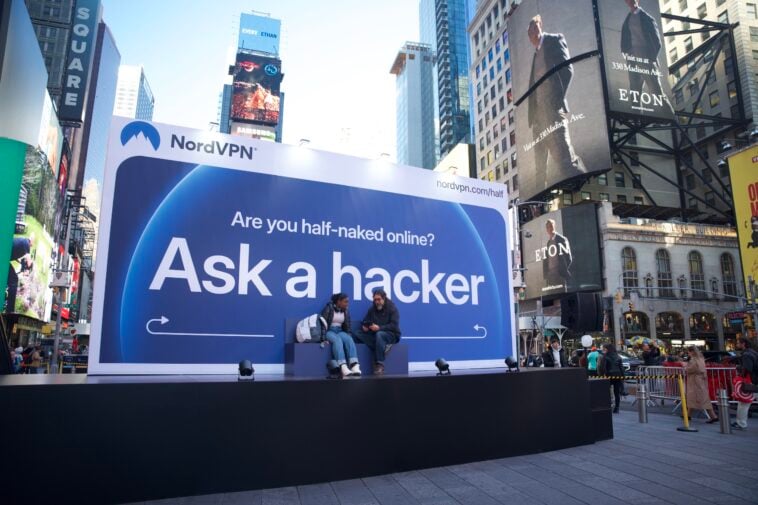NordVPN’s unveiling of its “Talk to a Hacker” billboard in Times Square yesterday wasn’t your typical marketing stunt—it was a brutal reality check that left participants visibly shaken.
The concept was simple: step up to an interactive billboard and have an ethical hacker show you, in real-time, exactly what information about you is already exposed online. No theatrics, just cold, hard data about your digital footprint.
Here’s the unsettling part: according to NordVPN, 73% of Americans believe their antivirus software protects them from identity theft, secures their data on public Wi-Fi, and guarantees online privacy. But in reality it doesn’t – and it’s a dangerous misconception.
As NordVPN’s CMO Toma Sabaliauskiene explained, we’re installing sophisticated alarm systems on our front doors while leaving every window wide open. Antivirus software handles certain threats, but it’s nowhere near the comprehensive protection most people assume they’re getting.
The ethical hackers—including NordVPN’s CTO Marijus Briedis and cybersecurity advisor Adrianus Warmenhoven—weren’t performing sophisticated attacks. They simply revealed what’s already accessible through data breaches and exposed information.
Participants discovered compromised passwords, publicly available home addresses, and Social Security numbers from previous breaches. The hackers identified interests, usernames, even the cars people drive. They pointed out malware infections and pulled up information from breached dating platforms, gaming sites, and fitness apps.
The reactions were telling. People genuinely didn’t realize how exposed they were.
Nearly 40% of Americans use public Wi-Fi regularly, but only half take protective measures. Half of all Americans have already discovered their personal data was leaked. While most worry about Social Security numbers and credit card details, cybersecurity experts warn that leaked contact information—email addresses, phone numbers—often serves as the entry point for more sophisticated attacks.
The message is clear: antivirus software is necessary but insufficient. Comprehensive security requires VPNs for public Wi-Fi, dark web monitoring, robust password management, and multi-factor authentication.
NordVPN has launched a campaign page at nordvpn.com/half where you can check if your data is exposed too and learn how to strengthen your online protection.
Yesterday’s stunt made invisible threats visible. Now the real question is whether people will actually do something about it.

